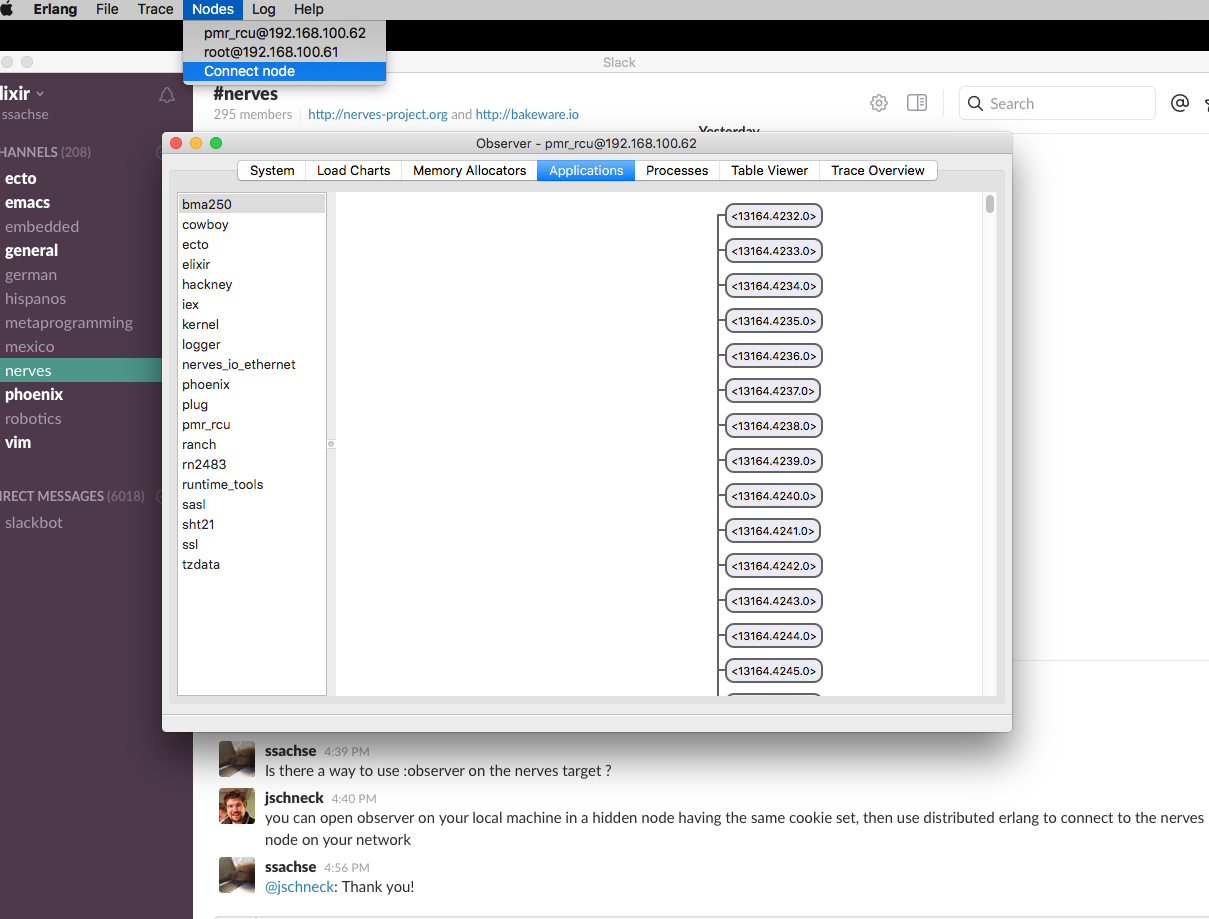Here I just write down notes, Ideas and solution I come over in learning Elixir especially based on nerves/bakeware
In order to check the setup in a nerves box I put following into the vm.args file
# rel/vm.args
## Name of the node
-name <node-name>@<ip-address>
## Cookie for distributed erlang
-setcookie secretIn the application I use Nerves.Io.Ethernet to setup eth0
case Ethernet.setup(:eth0) do
{:ok, _pid} -> Logger.info "dynamic IP #{Nerves.IO.Ethernet.settings(:eth0)[:ip]}"
_ -> {:ok, _pid} = Ethernet.setup( :eth0, mode: "static", ip: "10.0.0.5", router:
"10.0.0.1", mask: "16", subnet: "255.255.0.0", mode: "static",
dns: "8.8.8.8 8.8.4.4")
Logger.info "static IP #{Nerves.IO.Ethernet.settings(:eth0)[:ip]}"
endNow I can use on my development machine
iex --name console@<local-ip> --remsh <node-name>@<ip-address> --cookie secret Well I am using vim on my mac. Since I am trying a lot of things depending on the hardware of the nerves box I did setup a raspberry pi with raspian an a full blown elixir stack. I connect to this box with ssh from my mac. Since I feel it more pleasent to use vim on the mac I just put an alias in my zsh.
alias push_rpi='rsync --progress -arv --exclude=".git" --exclude="_images" --exclude="_build" --exclude="deps" ~/nerves/project1/ root@raspi:~/project1'So I can edit everything on the mac and just sent a :!push_rpi from vim an have it deployed to the development box. And when everything works I deploy it using bake to the nerves box
Thanks to Justin Schneck it's really easy. On the development machine you start a hidden IEx session
iex --name observer@<local-ip> --cookie secretWith the same cookie like on the nerves box On the nerves box you add
def application do
...
applications: [ ...
:runtime_tools,
...
]
...
endNow you can start Observer
Erlang/OTP 18 [erts-7.2.1] [source] [64-bit] [smp:8:8] [async-threads:10] [hipe] [kernel-poll:false] [dtrace]
Interactive Elixir (1.2.2) - press Ctrl+C to exit (type h() ENTER for help)
iex(observer@192.168.1.1)1> :observer.start
:okThanks to Information from https://elixir-lang.slack.com/team/jschneck you do following
On a linux VM (Ubuntu 14.04)
git clone https://github.com/nerves-project/nerves_system_brinstall
sudo apt-get install git g++ libssl-dev libncurses5-dev bc m4 make unzip cmakegit clone https://github.com/nerves-project/nerves_system_bbbcopy the linux config from nerves_system_br, for bbb located here https://github.com/nerves-project/nerves_system_br/board/bbb/linux-4.1.defconfig to nerves_system_bbb
cp board/bbb/linux-4.1.defconfig ../nerves_system_bbbedit the line https://github.com/nerves-project/nerves_system_rpi/blob/develop/nerves_defconfig#L30 to
BR2_LINUX_KERNEL_CUSTOM_CONFIG_FILE="${NERVES_DEFCONFIG_DIR}/linux-4.1.defconfig" in the linux defconfig, you are going to add `CONFIG_RTL8192CU=m And do
./create-build.sh ../nerves_system_bbb/nerves_defconfig ./bbb_build Now generate the tar file that you can move and decompress somewhere on your mac.
cd ./bbb_build
make systemthen from the nerves project do
export NERVES_SYSTEM=/path/to/decompressed/system
mix firmwareFile.ls("/lib/firmware") |> IO.inspect limit: :infinity